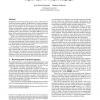Free Online Productivity Tools
i2Speak
i2Symbol
i2OCR
iTex2Img
iWeb2Print
iWeb2Shot
i2Type
iPdf2Split
iPdf2Merge
i2Bopomofo
i2Arabic
i2Style
i2Image
i2PDF
iLatex2Rtf
Sci2ools
125
click to vote
ICFP
2010
ACM
2010
ACM
Logical types for untyped languages
Programmers reason about their programs using a wide variety of formal and informal methods. Programmers in untyped languages such as Scheme or Erlang are able to use any such method to reason about the type behavior of their programs. Our type system for Scheme accommodates common reasoning methods by assigning variable occurrences a subtype of their declared type based on the predicates prior to the occurrence, a discipline dubbed occurrence typing. It thus enables programmers to enrich existing Scheme code with types, while requiring few changes to the code itself. Three years of practical experience has revealed serious shortcomings of our type system. In particular, it relied on a system of ad-hoc rules to relate combinations of predicates, it could not reason about subcomponents of data structures, and it could not follow sophisticated reasoning about the relationship among predicate tests, all of which are used in existing code. In this paper, we reformulate occurrence typing t...
Discipline Dubbed Occurrence | ICFP 2010 | Programming Languages | Type System | Variable Occurrences |
Related Content
| Added | 09 Nov 2010 |
| Updated | 09 Nov 2010 |
| Type | Conference |
| Year | 2010 |
| Where | ICFP |
| Authors | Sam Tobin-Hochstadt, Matthias Felleisen |
Comments (0)

